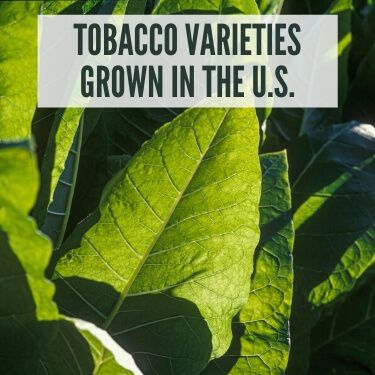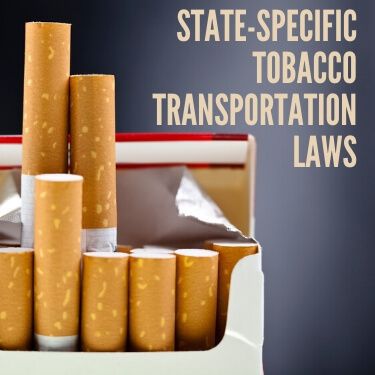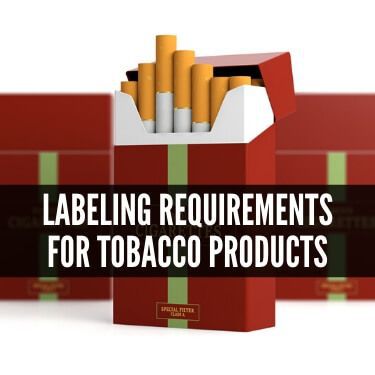Tobacco is hugely profitable, and there is a great need for tobacco shipping across the United States. To keep this shipping process organized and consistent, tobacco transportation laws are essential for ensuring that the products cross state lines while still adhering to federal law, and state or local laws. If you are a business owner specializing in tobacco products, you must understand everything there is to know about tobacco transportation to prevent falling afoul of state governments.
To comply with tobacco transportation laws, you will need to adhere to the rules outlined by the ATF and TTB. You will also need to be aware of state-specific laws before you ship, such as restrictions on the amount of product you are allowed to bring into the state and where you are allowed to deliver it.
To ensure public safety, especially the protection of children and adolescents, companies must abide by the tobacco transportation laws as outlined by the Guidance for Industry form as outlined by the Food and Drug Administration (FDA). Complying with these outlines will ensure proper measures are taken to reduce risk and harm for the public.

Tobacco is grown in many states across the United States. Statistics from 2012 measure there were around 800 million pounds of tobacco grown across 19 states, with North Carolina, Kentucky, and Georgia being the top tobacco producers in the country. North Carolina was responsible for growing over 450,000,000 pounds of tobacco, while Kentucky and Georgia produced over 214,000 pounds each. These states alone cultivated 80% of all tobacco across the country.
Other states with high tobacco production include Virginia, Tennessee, South Carolina, Pennsylvania, and Ohio.
The tobacco varieties grown in these states include Virginia, or flue-cured tobacco, and Burley tobacco. These tobacco varieties are cultivated and cured in different ways, which is what sets them apart. Virginia tobacco is cured for a week in a heated barn (or barns), while the Burley variety is air-cured for a maximum of two months.

To meet health care guidelines, tobacco products must be stored and transported safely. Both raw tobacco and ready-made products like cigarettes or cigars are some of the most sensitive goods you can ship, and because of this, they are at risk of a range of external factors.
Tobacco products are hygroscopic, which means they can absorb moisture from the air, as well as being prone to absorbing extraneous odors. Tobacco is also at risk of autolysis, rotting, mold, and self-heating. To prevent this, extra care should be taken to seal the tobacco to prevent contamination. It is also essential to follow cargo safety measures that will reduce the risk of further problems. While tobacco is capable of being shipped with other products, it depends on the risks each product poses for contaminating the tobacco.
Manufacturers and exporters must follow the rules when storing and shipping their tobacco products. If not, there is a risk that your inventory could become damaged during the journey, which could reflect poorly on your enterprise and leave your customers unwilling to engage in business with you again.
Issues that could occur if the guidelines are not followed adequately include pest contamination, decay, and general cargo damage. To ensure this does not happen, be sure to follow the guidelines set out by the relevant authorities.
Having the correct measures in place to prevent problems, such as increased moisture levels, both during storage and shipping, will ensure high-quality products, which will benefit your business in the long run. When storing and shipping tobacco, make sure your warehouse and cargo vehicles can protect the product.
The ATF is the acronym of the Bureau of Alcohol, Tobacco, Firearms and Explosives. It was formed on July 1, 1972, and is a federal law enforcement organization that is responsible for the investigation of the illegal production, use, and possession of firearms or explosives. It is also responsible for preventing the unlawful trafficking or tax evasion of alcohol and tobacco products.
The ATF has field offices across the United States, including tobacco-rich areas like Kentucky, North Carolina, and Philadelphia. In addition to these offices, there are also divisions worldwide, such as Canada, Mexico, Colombia, and the Caribbean.
The purpose of the ATF with regards to tobacco is to identify, target, and dismantle groups with links to crime, especially when involved with trafficking contraband tobacco across state lines. The ATF will also strive to prevent encroachment that could damage legitimate tobacco enterprises in the tobacco industry.
As it is illegal for anyone to transport, ship, possess, sell (or distribute by other means) over 100,000 cigarettes without evidence of the State cigarette tax payment, the ATF works to identify anyone or any criminal enterprise who could breach these laws. This is outlined under the Contraband Cigarette Trafficking (CCTA) guidelines. These outlines concern both traditional cigarettes and smokeless tobacco.
Overall, the ATF is a government institution tasked with tobacco control and the sale of such products.
The TTB is the Alcohol and Tobacco Tax and Trade Bureau, although it is more statutorily referred to as the Tax and Trade Bureau.
This agency is part of the United States Department of the Treasury. It is responsible for regulating and collecting taxes regarding the trade and imports from alcohol, tobacco, and firearms within the United States. The TTB is more recent than the ATF, having been formed in just 2003 following the Homeland Security Act splitting the ATF into two separate bodies.
The operations of the TTB are split into five divisions. These divisions are:
While all divisions are relevant to the transporting of tobacco to companies and vendors across the country, the Tobacco Enforcement Division is perhaps the most important. This area protects revenue while also promoting voluntary compliance through its monitoring of the domestic tobacco trade.
With this, it ensures that only qualified companies or individuals are designated to enter the tobacco trade. The criteria for such admission is compliance with necessary tobacco tax laws. If they find persons ignoring or avoiding such regulations, they help to facilitate the correct course of action of tobacco enforcement functions.
Other divisions set their focus on investigations regarding industry compliance, the payment of taxes as well as consumer protection and public safety. Vendors can apply for a permit for tobacco or alcohol businesses for free, with a straightforward online form requesting approval.
If you are vendor planning on selling any tobacco products, then you must first apply for a permit to do so. Even after application, you must still wait for approval to proceed with your business.
As mentioned above, the application process is relatively simple, and it is possible to complete it online within a few minutes, depending on the type of permit you are searching for. Companies or businesses, whether currently operating or not, can use this online form to apply for approval and permission to include the sale of tobacco products in their store, either physical or online.
There are five permit types to choose from, with each permit type covering a different aspect that the TTB is responsible for monitoring. For tobacco, this permit is known as the Tobacco Manufacturers, Importers and Exporters permit.
The TTB offers plenty of information regarding the next steps of the process. You must designate the type of business you hope to operate. In the case of the tobacco business, this includes
You must fill in the form correctly to minimize the chances of being rejected for approval and also ensure the application process runs smoothly without any delays.

Tobacco laws vary in different parts of the U.S., so you will need to understand the state-specific transportation laws before planning your first shipment across state lines. There may be laws that apply to you even if you are just driving through a state without making a stop there.
Companies that engage in interstate commerce of tobacco products must ensure they are registered with the ATF. With this registration, there is also a requirement for them to report certain information.
Are shipping tobacco across the country? Get the scoop on freight shipping from Virginia to California, freight shipping from South Carolina to California, and beyond.
While it is legal to ship tobacco products across state lines, there are still restrictions in place. For example, some states require you to limit the number of tobacco products, such as cigarettes or packages of rolling tobacco, to a certain amount. This amount may vary between states, especially when you consider that some states are more prominent tobacco producers than others. North Carolina tobacco transportation laws, therefore, would be different from those in California.
If you are sending tobacco products to a specific state rather than a wide range of states for consumer use, it is worth understanding whether there are different laws involved in the exporting of your tobacco products. Understanding these laws will help you approach your transportation duties more effectively.
Some states, such as Arkansas, Connecticut, Maryland, and New York have banned the transportation of tobacco products directly to the consumer, so this is something you must keep in mind when arranging a shipment.
Taxes can always be a tricky thing for any business, but they are integral to the correct compliance of tobacco transportation laws. These taxes are used as a measure of tobacco control, but these taxes vary between states.
Alexander Hamilton first implemented a federal excise tax on tobacco in 1794. However, this eventually failed and was not reintroduced until 1862.
Currently, Missouri has the lowest excise tax per pack of cigarettes, costing just $0.17, whereas New York has the highest, with $4.35 per pack. Conversely, non-cigarette products such as cigars and pipe tobacco may come with their own tax measurements, which is something to remember.
When determining the taxes for your tobacco products, you will need to consider these state tax outlines and laws, and this number could change when shipping tobacco to another state entirely.
Keeping and maintaining records is essential in all business ventures. Still, with something as sensitive as tobacco, with a need to focus on, adhere to, and comply with the specific transportation laws, it is much more vital when compared to other businesses shipping different products.
These records are crucial to guaranteeing absolute compliance with tobacco transportation laws. Keeping a strict and correct history of how much tobacco you purchase, manufacturer, sell, or distribute will help the TTB and ATF better trace any infractions or unusual occurrences. With accurate records of any transactions you have engaged in, you can rule yourself out from suspicion while also perhaps assisting with any investigations in your state.
Despite this, keeping and maintaining proper records is not merely about complying with tobacco transportation laws. In addition to this, the recordkeeping requirements are also designed to reduce cigarette trafficking, as outlined in the Prevent All Cigarette Trafficking Act (PACT), which was published in 2009.
The PACT Act includes a range of components designed to reduce illegal cigarette trafficking, both across state lines or over national borders. It helps to regulate the mailing of cigarettes or smokeless tobacco through the USPS while also adding new and improved requirements for registration, reporting, delivery, and recordkeeping. Those who fail to comply could face up to 3 years imprisonment. For this reason, it is vital that you thoroughly log weight, quantity, profit and additional payments for the fiscal year, and the time and date your inventory left your warehouse or store.
By creating a thorough log of records, you can support the ATF and other government bodies with state and local demands or investigations.

Labeling requirements are essential for focusing on the health aspect of selling cigarettes and other tobacco products. The FDA is responsible for deciding on and enforcing these requirements, and the United States, at the moment, requires that one of four predetermined warning labels must appear on the packaging or advertisements.
In addition to standard cigarette or rolling tobacco packages, smokeless tobacco cases or packaging also require warning labels. The guidelines for this demand that the warning label statement must cover 30% of two primary sides of the package.
Some companies attempted to skirt such requirements by using ‘reduced harm’ words, such as ‘Light’, ‘Low’, or ‘Mild’. However, this is prohibited under the FDA regulations unless express approval has been granted.
Currently, the four health warnings found on tobacco products and in advertisements cover the presence of carbon monoxide in cigarette smoke, the harmful effects smoking can have when pregnant, the chances of lung disease and cancer, and general risks to your health. These warnings have been used on tobacco products since 1984, with photographic warnings, demonstrating evidence of disease or outlining the addictive properties of nicotine, coming into circulation in 2010.
In January of 2020, the FDA proposed further improving the labels and delivered thirteen proposed health warnings for tobacco products moving forward. This change comes from research to develop new labels and warnings that adhere to the safety requirements of the Tobacco Control Act (TCA).
Finding the right shipping partner is essential for guaranteeing your goods arrive at their destination safely and securely. R+L Global Logistics offers experienced and dependable service that covers a range of truckload shipping demands suitable for all businesses. We endeavor to provide excellent and efficient service that you can rely on, and we guarantee that our shipping experts will deliver your goods and products to its destination with care and success. We handle everything, including your apparel supply chain needs.
Companies who are in the business of selling cigarettes or have a need to ship tobacco products, including cigars and loose-leaf tobacco packaging, can rely on R+L Global Logistics to ensure their stock arrives at its destination on time without issue. We understand the intricacies of tobacco transportation laws and are well equipped to provide support every step along the journey.
With R+L Global Logistics, you can trust that your inventory is in safe hands no matter where you need to ship your goods, whether that’s shipping from Virginia to Florida, or anywhere else.
Our truckload shipping service includes:
R+L Global Logistics strives to establish long-lasting relationships with our clients to build trust and respect between both parties.
For stress-free shipping with our Dry Van, Intermodal, Expedited, Temperature-Controlled, Flatbed, and other services, get in touch with us today at (866) 353-7178 for a free shipping quote. Our dedicated service team will be happy to help you with any questions.
The TTB offers plenty of information regarding the next steps of the process. You must designate the type of business you hope to operate. In the case of the tobacco business, this includes:
Tobacco Export Warehouse Proprietor
Tobacco Importer
Tobacco Products Manufacturer
Manufacturer of Processed Tobacco (MPR)
Importer of Processed Tobacco
In addition to standard cigarette or rolling tobacco packages, smokeless tobacco cases or packaging also require warning labels. The FDA guidelines for this demand that the warning label statement must cover 30% of two primary sides of the package.
Tobacco laws vary in different parts of the U.S., so you will need to understand the state-specific transportation laws before planning your first shipment across state lines.
R+L Global Logistics
315 NE 14th St., Ocala, FL 34470
We purchased a pallet of vapes from an auction in Florida and we need it shipped to Virginia. Is this possible?
Hello,
My company would like to transport Tobacco and Vapes from IL to CA.
Do we need any specific permit or not?
If we do, can you direct us where to apply?
Thank you!